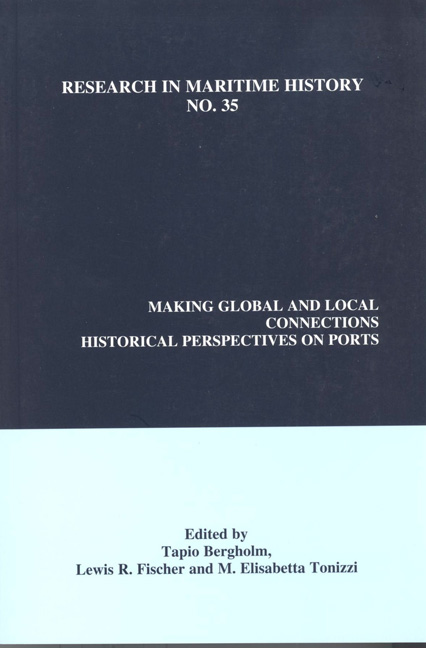Book contents
- Frontmatter
- Contents
- Contributors' Notes
- Contributors
- “Introduction”
- Part I Port Case Studies
- Part II Port Systems
- “The Northwest Portuguese Seaport System in the Early Modern Period”
- “Discourse and the Container Revolution in Finland in the 1960s and 1970s”
- “The Ports of Northern Chile: A Mining History in Long-run Perspective, 1880-2002”
“Globalisation and Privatisation of Ports in Turkey”
from Part II - Port Systems
- Frontmatter
- Contents
- Contributors' Notes
- Contributors
- “Introduction”
- Part I Port Case Studies
- Part II Port Systems
- “The Northwest Portuguese Seaport System in the Early Modern Period”
- “Discourse and the Container Revolution in Finland in the 1960s and 1970s”
- “The Ports of Northern Chile: A Mining History in Long-run Perspective, 1880-2002”
Summary
Introduction
Globalisation has reduced the significance of territoriality. At the same time, the political environment has come to favour liberal economic policies, including privatisation, in many countries since the late 1970s. Though ports have mostly been considered “public goods” and are generally assumed to be owned and operated by the state, new patterns of governance in port operations and services have led to privatisation, liberalisation, commercialisation and competition. Turkey has been no exception and has initiated privatisation policies for ports through the Privatisation Law ratified in 1994, although the “public good” concept has not been eliminated entirely. Thus, methods of privatisation other than outright sales, including the transfer of operating rights, Build-Own-Operate (BOT) or similar methods, might be viable within this framework. The Turkish Maritime Administration (TDI) and Turkish Republic State Railways (TCDD) are the two state-owned enterprises that own ports in Turkey. Both have been included in the privatisation portfolio with the aim of increasing productivity and efficiency by developing competition through private sector investments and, most important, furthering Turkish integration within the European Union (EU) and the global economy.
The Impact of Globalisation on Privatisation
Privatisation can be broadly defined as the shifting of economic functions (mostly ownership) from the public to the private sector. This involves an increased reliance on private actors and market forces to perform functions that have previously been regarded as within the governmental sphere. The state has a dual relationship between socio-economic structures and an international system of states which emphasises interdependence. The scope of economic activities has expanded as a result of globalisation, including new patterns of governance through privatisation. Within the transport sector, ports have been recognised for their role in economic growth and development. Just as globalisation has promoted the interdependence of nations, the volume of trade passing through ports has had significant effects on their wealth.
With the rise of globalisation, many have come to question the role of the nation-state. The range of economic activities that cross territorial boundaries has expanded, as have the ways that people view the world. Many of the challenges facing port operators arise from these phenomena. Transferring ownership or operating rights of state enterprises to private companies, and finding a new balance between the public and private sector, has been one of these, and ports have not been immune.
- Type
- Chapter
- Information
- Making Global and Local ConnectionsHistorical Perspectives on Ports, pp. 171 - 194Publisher: Liverpool University PressPrint publication year: 2007



